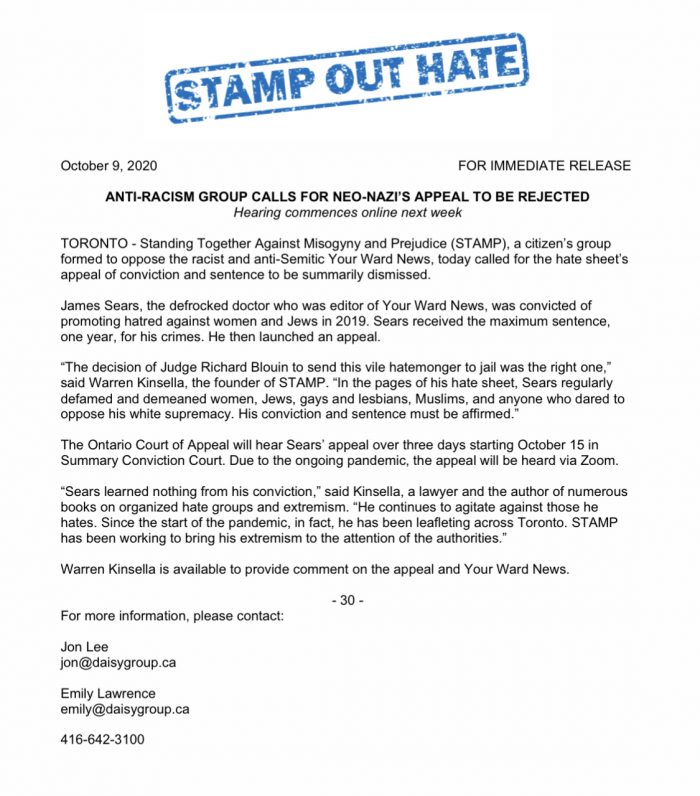The debate in tweets: Trump too late, Biden biding time
Trump walks like a gorilla with hemorrhoids. #Debates2020
— Warren Kinsella (@kinsellawarren) October 23, 2020
Trump has a mouth like a sphincter. #Debates2020
— Warren Kinsella (@kinsellawarren) October 23, 2020
Trump’s facial makeup makes Mickey Rourke look natural. #Debates2020
— Warren Kinsella (@kinsellawarren) October 23, 2020
Biden using mask for emphasis. Works. #Debates2020
— Warren Kinsella (@kinsellawarren) October 23, 2020
Trump is presently medicated. It’ll wear off. #Debates2020
— Warren Kinsella (@kinsellawarren) October 23, 2020
When Trump denounced xenophobia, just now, cisterns of holy water started to boil in churches across America. #Debates2020
— Warren Kinsella (@kinsellawarren) October 23, 2020
The Basement Association of America has condemned this baseless attack on basements. #Debates2020
— Warren Kinsella (@kinsellawarren) October 23, 2020
Everything is China’s fault. Including Milli Vanilli and Lou Reed’s Metal Machine Music. #Debates2020
— Warren Kinsella (@kinsellawarren) October 23, 2020
Every parent in the world is noticing, right about now, what the threat of cutting off microphones can do to improve the behavior of the misbehaving. #Debates2020
— Warren Kinsella (@kinsellawarren) October 23, 2020
In his later years, King Kong would often wear suits and ties and try and make new friends, but without any success. #Debates2020 pic.twitter.com/zYGCDvIQh7
— Warren Kinsella (@kinsellawarren) October 23, 2020
Rude Rudy Giuliani reference! Did Rude Rudy know she was 15? #Debates2020
— Warren Kinsella (@kinsellawarren) October 23, 2020
When Trump said he didn’t get money from Russia, 1,000 lie detector machines exploded simultaneously. Boom. #Debates2020
— Warren Kinsella (@kinsellawarren) October 23, 2020
Trump’s medication is wearing off. #Debates2020
— Warren Kinsella (@kinsellawarren) October 23, 2020
SECRET CHINESE BANK ACCOUNT you’re welcome. #Debates2020
— Warren Kinsella (@kinsellawarren) October 23, 2020
Vampires don’t cough. https://t.co/c2le4tCX6C
— Warren Kinsella (@kinsellawarren) October 23, 2020
He prepaid millions and millions of INVISIBLE DOLLARS #Debates2020
— Warren Kinsella (@kinsellawarren) October 23, 2020
What’s the difference between a phony witch hunt, and one that isn’t phony? Do you get better-quality witches? #Debates2020
— Warren Kinsella (@kinsellawarren) October 23, 2020
Candid photo of Trump visiting his next residence. #Debates2020 pic.twitter.com/Q4mo4bmGnK
— Warren Kinsella (@kinsellawarren) October 23, 2020
Trump is betting the election on stuff about Biden’s family that Donald Trump Jr. came up with when he was on another cocaine binge. #Debates2020
— Warren Kinsella (@kinsellawarren) October 23, 2020
Trump launches a highly effective attack on people who sit around the kitchen table. #Debates2020
— Warren Kinsella (@kinsellawarren) October 23, 2020
Trump plays an invisible accordion. Continuously. #Debates2020 pic.twitter.com/wPnEs7KWpY
— Warren Kinsella (@kinsellawarren) October 23, 2020
The allegation that his hands are weirdly small is simply wrong. #Debates2020 pic.twitter.com/SPt0GfYtLR
— Warren Kinsella (@kinsellawarren) October 23, 2020
It would be just awful if Trump had a stroke because he’s getting so upset. Awful. #Debates2020
— Warren Kinsella (@kinsellawarren) October 23, 2020
If Tourette’s was a person. pic.twitter.com/RG2V8d0KuD
— Warren Kinsella (@kinsellawarren) October 23, 2020
When Joe Biden says “come on,” it’s exactly what my Mom used to say when I was in high school and saying I did not drink at parties. #Debates2020
— Warren Kinsella (@kinsellawarren) October 23, 2020
Yes, he’s not completely Satanic tonight. Just mostly. #Debates2020 https://t.co/62R3CkrJan
— Warren Kinsella (@kinsellawarren) October 23, 2020
BREAKING: Trump says every state is different. #Debates2020
— Warren Kinsella (@kinsellawarren) October 23, 2020
Biden just killed Trump on the issue of children forcibly separated from their parents. Killed him. #Debates2020
— Warren Kinsella (@kinsellawarren) October 23, 2020
Good. Trump just said kids not knowing where their parents are is “good.” #Debates2020
— Warren Kinsella (@kinsellawarren) October 23, 2020
It’s an opinion. Mine is informed. Yours is delusional. https://t.co/zdARLCfKoi
— Warren Kinsella (@kinsellawarren) October 23, 2020
“Nobody has done as much TO the black community as Donald Trump.” #Debates2020
— Warren Kinsella (@kinsellawarren) October 23, 2020
Immigration detention happened first in the US at Ellis Island in 1890. Trolls saying Biden came up with it will get blocked.
— Warren Kinsella (@kinsellawarren) October 23, 2020
Windmills cause pollution. That’s even better than trees cause acid rain. #Debates2020
— Warren Kinsella (@kinsellawarren) October 23, 2020
That moderator was outstanding. #Debates2020
— Warren Kinsella (@kinsellawarren) October 23, 2020
Trump was not as much of a disaster as he’s been throughout this entire campaign. But it’s too late, because the gettable vote is really small: people have made up their minds. It’s all ground game, starting this weekend. #debates #USPolitics
— Warren Kinsella (@kinsellawarren) October 23, 2020

